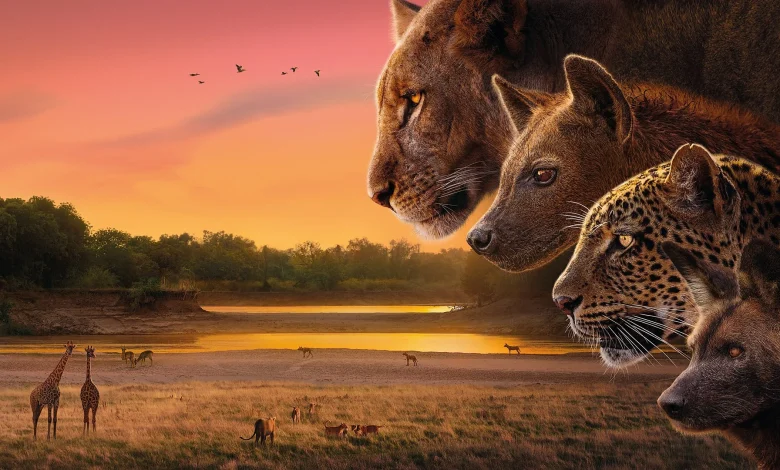Kingdom – Everything you need to know about the new wildlife series narrated by Sir David Attenborough

Published: 12:01 am, 4 November 2025
Image: BBC Studios/Anna Place/Felicity Lanchester/Amy Gilchrist/Nick Riley/Lauren Jackson/Simon Blakeney/Ason Mwale/Eric Njobvu; Getty Images
Coming to BBC One and iPlayer, Kingdom is an epic six-part series narrated by Sir David Attenborough from the BAFTA award-winning BBC Studios Natural History Unit. Across six episodes in one of the most ambitious wildlife series ever made, Kingdom follows four rival animal families over five years, telling their stories as they compete for survival and dominance in one of the most spectacular places on Earth.
In the heart of Zambia, leopards, hyenas, wild dogs and lions all lay claim to a corner of South Luangwa National Park known as Nsefu – a lush landscape situated on the banks of the mighty Luangwa River. Teeming with life, Nsefu is an ideal place to raise a family – and that means that things can get crowded here…
Kingdom follows the stories of four animal families – a lion pride, a wild dog pack, a hyena clan and a leopard family – who are all competing to make Nsefu their home. It’s a story about endurance, control, ever-shifting power dynamics, and perhaps the greatest challenge of all: raising a family in a competitive world.
Leopard Olimba is attempting to bring up her young cubs in the centre of Nsefu, when everything is thrown into chaos by the dramatic arrival of wild dog queen Storm and her pack. But Storm’s pack must soon reckon with a lion pride who have just returned to the area, and who attack the local hyena clan, ruled by matriarch Tenta. But even lions must remain vigilant here, especially when they have cubs themselves.
These families are all ferocious predators, but Kingdom lets us see a gentler side: tender hyena mothers suckling their cubs for longer than any other predator, leopard Olimba allowing her cubs to practice their hunting skills on a grumpy hippo, and wild dogs demonstrating an extraordinary level of care for an injured pack member. There are internal family politics too – mother and daughter leopards become each other’s biggest rivals and elemental forces regularly reset the stage – fires, floods and a bountiful river that governs all life here. In Nsefu, the fates of these four families are inextricably linked. As they rise and fall over the years, who will ultimately rule this precious Kingdom?
This is the longest the BBC Studios Natural History Unit has been embedded in one location, tracking the lives of individual animals, for a single series. Spending around 1400 days in the field, working alongside local crews and experts, Kingdom not only documents the story of some of Africa’s most charismatic, but also shines a light on the efforts to protect them from poaching by leading conservationists.
Kingdom, a 6×60’ for BBC One and iPlayer, is made by BBC Studios Natural History Unit, co-produced by BBC America. It was commissioned by Jack Bootle, Head of Commissioning, Specialist Factual. The Executive Producer is Mike Gunton, the Series Producer is Felicity Lanchester and the Series Editor is Simon Blakeney.
AJ2
Meet the families
The Leopards
Olimba and Mutima
Image: BBC Studios/Anna Place/Esther Gillespie/Ason Mwae; Eric Njovu/Nick Riddin/Edward Selfe
One of the most iconic big cat species found across Africa and parts of Asia, leopards are one of Nsefu’s apex predators. Known for their distinctive spotted coat – perfect for camouflage while hunting – these big cats specialise in stealth. In Kingdom, we follow Olimba, one of the most successful leopard mothers ever observed in Nsefu, having raised three cubs to independence from three different litters. Now, however, can Olimba navigate the changing power dynamics in the region to successfully get her two young cubs to maturity? Even a successful motherhood has its own risks – could her offspring grow up to become her biggest rivals?
The Wild Dogs
Storm and Her
Image: BBC Studios/Anna Place/Simon Blakeney/Getty Images
Wild dogs are one of the most sociable mammals in the world, living in packs where they are known for sharing food and cooperatively caring for the lead female’s pups. With their distinctive patchwork coats and bat-like ears, wild dogs are one of Africa’s most endangered predators. Our story follows Storm, the alpha female of a young wild dog pack which bursts onto the scene in Nsefu, looking to make it their home. We’ll follow Storm’s pack as they try to stake their claim, and work together through the successes and failures of raising a new generation of pups every year. Not only this, but Storm’s family also embarks on a remarkable rescue of an injured relative, revealing just how deep the bonds within a pack can run.
The Lions
Rita’s Pride
Image: BBC Studios/Anna Place/Lauren Jackson/Getty Images
The savannah’s most iconic apex predator, lions need no introduction. These highly social big cats live in groups, or prides, where the females do most of the hunting. All lions have unique whisker spots which is how the Kingdom team were able to identify the members of the pride and follow their unique story. Across the series we follow experienced lioness Rita and her pride as they try to build and hold onto their power in Nsefu. We see Rita and the pride navigate not only shifting power dynamics with the hyena clan, but also elemental forces, the challenges of motherhood, conflict with rivals and even threats from the world outside the national park.
The Hyenas
Tandala and Tenta’s Clan
Image: BBC Studios/Simon Blakeney/Anne Place/Getty Images
Although hyenas are effective hunters themselves, they are famed for scavenging and have excellent senses of hearing and smell that frequently brings them into contact with other predators, often leading to dramatic conflict. Despite their somewhat dog-like appearance, hyenas are actually more closely related to cats, mongooses and civets, and live in matriarchal clans. Kingdom follows the story of first-time mother Tandala, and her mother and queen, Tenta. Over the course of the series, we witness intimate family scenes at the communal den and follow the clan as they go head-to-head with the other predators. A new hyena queen will emerge, but will it be enough for the clan to challenge Rita’s lion pride for supremacy in Nsefu?
Series Facts
Kingdom Director of Photography Mark MacEwen filming African wild dogs (Lycaon pictus)
- The Kingdom team filmed the series across 5 years, spending around 1400 days over 76 shoots in Nsefu.
- Filming Kingdom required a team of over 170 people, including over 90 local Zambian crew members and wildlife experts.
- The team used a mix of long lens camera systems, camera traps, drones, thermal imaging cameras, car rigs, helicopter rigs and infra-red-light cameras to capture the behaviour of the four animal families.
- Nsefu covers an area of 87 square miles (226 square kilometres), almost the same as Birmingham.
- The team’s base camp ran on power generated entirely by solar panels, including a solar water pump. It included two repurposed shipping containers used as an office and a kit storage space, one of which had solar powered air conditioning to keep the equipment cool in 40+ degree dry-season heat!
- Over the course of five years during filming, the crew had various close encounters with the local wildlife. Some of these included a bathroom being destroyed by an elephant, a black-necked spitting cobra having to be removed from a tent and the crew discovering a crocodile sunbathing on one of their tent porches. One producer was even chased by a baboon brandishing a toilet brush! (No crew or animals were harmed!)
- Olimba has successfully raised three cubs to independence from three different litters (two female cubs and one male cub). This could become four if she can raise her latest male cub to independence too, making her one of the most successful leopard mothers ever recorded!
- Mutima has a very distinct and special heart-shaped birth mark on her left flank. Her name Mutima means “Heart” in Nyanja (the predominant language of the region).
- Counting all the many puppies, the wild dog pack contained 34 different dogs throughout filming – making things very tricky for the researchers identifying them all. The wild dog team had to learn to identify all their individual coat patterns, to allow them to follow our main characters.The wild dog pack caught the crew’s attention because Storm’s dad was the longest ruling alpha and longest living dog recorded in the area, dying at over 12 years old. He produced over 208 direct descendants.
- All lions have unique whisker spots, which the crew used to identify over 20 lions across the series.
- At the end of filming, the Nsefu pride had eight cubs, making it the biggest this family has ever been.
- Little was known about Nsefu’s hyenas before Kingdom started filming, but the Zambian Carnivore Programme started monitoring them intensively in the same year, with the crew’s help.
Filming Firsts
Kingdom Field Director Lauren Jackson operates a jib-mounted Gyro Stabilised Camera (GSS) to capture dynamic shots of the lions (Panthera leo)
- Kingdom is a first in natural history programming in that it documents the hierarchy of some of Africa’s deadliest predators by following the changing dynamics between known individuals across five years.
- Kingdom filmed a six-month-old leopard cub working with his mother to push a hyena off a kill for the first time.
Interview with Executive Producer Mike Gunton
Kingdom series cinematographer Lianne Steenkamp films leopard (Panthera pardus) Olimba from a specially adapted vehicle
What sets Kingdom apart from other NHU (Natural History Unit) series?
If I had to pick one word to describe Kingdom it would be ‘intensity’. It’s almost Shakespearean in its feel, and it’s incredibly ambitious in its scale. It’s a story that speaks across the ages because it focuses on four families in one location all struggling to survive. They’ve got their internal struggles, but they’ve also got struggles against the other rival families. And this creates a really intriguing tapestry of rich stories.
It’s high drama – it’s got a bit of Game of Thrones, it’s got a bit of Succession, but it’s also got a bit of The Lion King. But Kingdom also has this wonderful warmth about it. It can be quite a white-knuckle ride at times, but there are also some wonderful moments of beauty and tenderness. We’ve tried to construct it as a bingeable continuing narrative.
We filmed over five years, which is the longest we have ever continuously filmed in one location, and that in itself is quite an achievement. There are of course risks to putting all your eggs in one basket by focusing solely on one location, but it has absolutely paid off with Kingdom.
We worked closely with the local scientists and conservationists on the ground in Nsefu. A lot of them have been there for generations, so they know all the stories, the backgrounds and the family lineages of all the main players. That gives us a huge advantage in figuring out what’s going on between these four families.
What can audiences expect to see?
From the start when we’re parachuted into this extraordinary location, it’s in complete turmoil. The lion pride, which has previously been dominant, has depleted and suddenly, out of nowhere, a family of wild dogs arrives on the scene and creates utter chaos. We see this unfold through the eyes of all the main players. We get to see it through the eyes of this wonderful leopard, Olimba, who has been in Nsefu for all her life and seen all manner of things come and go. We have a hyena family and then a lion family which has depleted in numbers and has lost its ‘mojo’.
Over five episodes, we see how the power of these rival families waxes and wanes. We start off with the dogs in the ascendant, and then something happens to them, and then suddenly the hyenas are in the ascendant, but then something happens to them… So you’re constantly caught in this rollercoaster of shifting power dynamics. It’s a bit like watching the top of the Premier League, like a leaderboard of who’s winning and who’s losing. You’ve got this constant sense of wondering what’s going to happen next. And I think as you watch it you begin to start rooting for a team, but what’s strange is that you’ll probably also switch teams as the story goes on. One minute you’re team lion, the next you might be team hyena.
I don’t think anybody’s ever tried to tell this story from so many different perspectives. And the thing that I think is really exciting about it is that it doesn’t feel like you’re creating this in the cutting room. It feels very real, very observed and very of the moment. You don’t feel the hand of the filmmaker as such – it feels authentic and very visceral. Even though it’s filmed beautifully, it almost feels like you’re watching everything unfold through CCTV.
A male lion (Panthera leo) surveys his kingdom at dawn (Image: BBC Studios/Nick Riley)
There are some real gut-churning moments in Kingdom, but then also some very warm and tender family moments. For you, do you have a particular highlight from the show?
I think the moment that we meet Olimba, and you see this beautiful leopard with her young cubs, and you’re lulled into this very idyllic moment of wonderful natural history. Then, suddenly, out of nowhere, these wild dogs come in like a rampaging army and turn everything upside down. They chase all the prey around, Olimba has to disappear – even the elephants are freaked out. It’s a very dramatic incident.
If you were writing a drama that’s the kind of moment you would want to write into the script. That sets the scene of the series so powerfully. I think that’s a favourite moment for me.
If you had to pick, are you Team Lion, Team Leopard, Team Wild Dog or Team Hyena?
Oh, team Olimba, definitely! Of all these animals, she’s at the bottom of the pecking order. We think of leopards as these beautiful and very powerful animals, but actually because they’re solitary, they find it quite tough in an environment surrounded by these other multi-individual animal families and packs.
These families have the numbers, which is essentially a kind of power which Olimba never has, so she’s always having to bob and weave between them all. But she’s so clever, she’s so accomplished and she’s such a survivor. I love the fact that throughout all this turmoil and the ups and downs of all these other players coming and going, retreating, and the rest of it, throughout all of that, she’s still there.
She nurtures, yet she also then has to give out some tough love, and then she also has to look after herself, and then she has to try and find a male. She has to be clever, she has to make difficult decisions about herself and her family, which I think are very empathetic.
What do you hope audiences take away from Kingdom?
I want audiences to marvel at these animals and the intensity of their day to day lives in Nsefu. I want audiences to witness the determination of these animals to do what it takes to survive and do the best they can for themselves and their families. It’s quite reflective of our own lives. We have our own ups and downs, but these animals, every single day, are having to make intense life of death decisions. They have such resilience. I think it’s very uplifting in that way. Of course, it’s a tough watch at times but ultimately, it’s about resilience, hope, and success.
Having spent so much time observing these animals and filming them, we’re seeing amazing bits of animal behaviour that people have never seen on television before, like wild dogs working together to force hyenas off a kill.
I think there’s a lot we can learn from the show on animal behaviour. I believe audiences will learn more about Africa and East African predators from Kingdom than anywhere else. These predators are top of the food chain and what they do influences the whole ecosystem, like a pyramid, it trickles down.
The stars of our show are of course our four rival families, but we’ll see all sorts of other creatures, from hippos to storks and crocodiles. There’s lots of supporting characters who have important roles to play.
What does it mean to have Sir David Attenborough narrate the series?
I’ve worked with David for many years, and every show I’ve worked with him on he always brings that important ingredient. It’s more than just being the voice, whether that’s authenticity, intensity, or whether that’s humour. Kingdom is not a fairy story, it’s a very real story. And I think you need David with you to guide you through it and to reassure you that it will be all right in the end.
There’s going to be some ups and downs, but it’s worth the journey. I suppose it’s just having him hold your hand, saying, this is going to be a bumpy ride, but stick with it, it’s going to be amazing. And he does that so brilliantly. Nsefu is a dynamic place, stuff happens completely out of the blue and things are constantly changing. It’s sometimes rough and raw, but it’s also gorgeous and beautiful. Having David there brings that safety.




